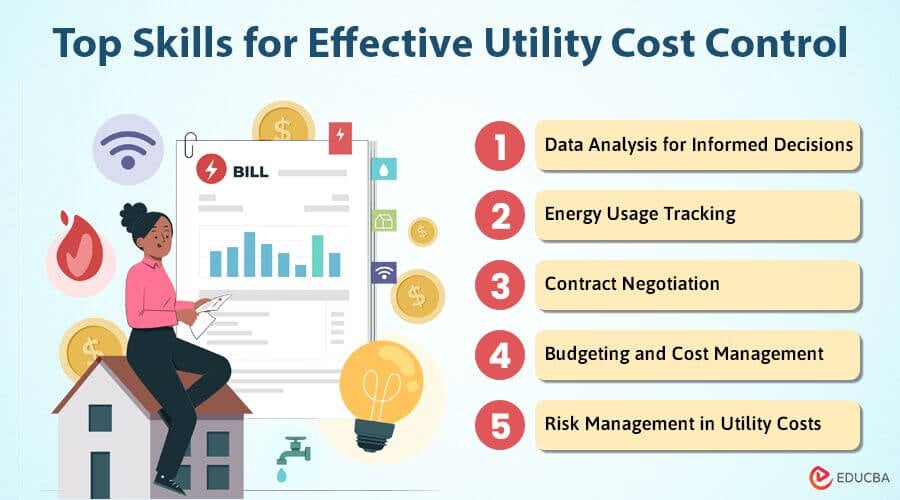
The Art of Utility Cost Control
Efficient resource management is crucial for businesses to stay competitive. Utility cost control is one area where business leaders can significantly reduce expenses and improve sustainability. Companies can optimize their operations and lower overheads by understanding how to track energy and utility consumption and analyze charges. Platforms like Utility Bidder can offer valuable insights to help businesses cut utility bills. This article explores the essential skills every business leader should develop to manage utility costs effectively, leveraging modern tools and e-learning resources.
Top Skills for Effective Utility Cost Control
Here are the key skills every business leader should master to manage utility costs:
#1. Data Analysis for Informed Decisions
Analyzing utility data helps identify inefficiencies and areas for improvement. Leaders need to track utility bills, consumption patterns, and costs to make informed decisions about energy management.
Tools: Energy management systems are vital for tracking and analyzing utility data.
#2. Energy Usage Tracking
Keeping a close eye on energy use is important for identifying wasteful practices. By using real-time tracking tools, businesses can improve energy efficiency and cut unnecessary costs.
#3. Contract Negotiation
Negotiating better rates with energy suppliers can lead to significant savings. Leaders can compare rates and secure more competitive contracts by leveraging platforms like Utility Bidder. Reviewing contracts regularly ensures businesses are getting the best rates.
#4. Budgeting and Cost Management
Effective utility cost control involves creating accurate budgets and managing costs. Proper financial planning helps businesses allocate resources for utilities without compromising on operations.
Key Steps:
- Set realistic utility cost targets.
- Incorporate contingency funds for unexpected cost increases.
- Use forecasting tools to predict future utility expenses.
#5. Risk Management in Utility Costs
Utility prices fluctuate, posing risks to business budgets. To mitigate price volatility, leaders should implement risk management strategies, such as fixed-rate contracts or investing in renewable energy.
#6. Leveraging Online Learning Resources
E-learning platforms can provide valuable insights into utility cost control. Energy efficiency and cost management courses help leaders stay updated and implement the latest strategies for reducing utility costs.
Suggested Resources:
- Online courses on energy management.
- Webinars on utility cost control.
- Case studies on industry-specific energy-saving strategies.
#7. Leadership and Collaboration
Strong leadership aligns the organization with utility cost control goals. Collaboration across departments drives the creation and implementation of cost-saving strategies. Collaboration across departments is vital for creating and implementing cost-saving strategies.
#8. Innovation and Energy Alternatives
Innovative energy solutions like solar panels or wind turbines can reduce reliance on traditional energy sources and significantly lower costs. Investing in renewable energy saves money and contributes to a greener future.
Key Cost Control Skills at a Glance
| Skill | How It Helps | Example of Use |
| Data Analysis | Identifies wasteful energy use | Tracking energy use to reduce peak-time electricity bills. |
| Contract Negotiation | Reduces overall utility costs | Securing a fixed-rate deal for gas to prevent price spikes. |
| Energy Usage Tracking | Enhances energy efficiency | Real-time monitoring to optimize energy use during production. |
| Risk Management | Minimizes financial risks | Using energy services that provide price stability options. |
| Collaboration | Promotes shared responsibility | Engaging staff to implement energy-saving measures. |
| Use of Online Resources | Improves knowledge and skills | Taking a course on energy management to implement cost-saving strategies. |
How Business Leaders Can Master Utility Cost Control?
To become an expert in utility cost control, business leaders should:
- Invest in Energy-Efficient Technologies: Technologies like LED lighting, energy-efficient HVAC systems, and smart meters can help businesses optimize energy consumption.
- Train Staff on Cost-Saving Practices: Ensure employees recognize the value of energy efficiency and how their actions help lower utility bills.
- Utilize Software to Track Utility Bills: Use energy management systems and software to monitor and manage utility costs effectively.
By adopting these strategies, businesses can save money, improve operational efficiency, and move towards a more sustainable future.
Final Thoughts
Mastering utility cost control is crucial for modern business leaders. Leaders can reduce utility costs, increase operational efficiency, and drive long-term sustainability by focusing on data analysis, energy usage tracking, contract negotiation, and leveraging innovative energy solutions. Continuous learning through e-learning platforms also helps businesses stay ahead of the curve in energy management and cost control.
Frequently Asked Questions (FAQs)
Q1. How can businesses reduce utility costs effectively?
Keep track of energy consumption, secure better contracts, and use energy-efficient practices. Tools like energy management systems also help businesses track consumption and identify inefficiencies.
Q2. Are renewable energy options cost-effective for businesses?
Renewable energy sources such as wind turbines and solar panels can lower long-term energy expenses and lessen dependence on traditional energy, potentially saving up to 25% annually.
Recommended Articles
We hope these utility cost control strategies help optimize your business. Check out these recommended articles for more insights on reducing energy expenses and improving sustainability.

